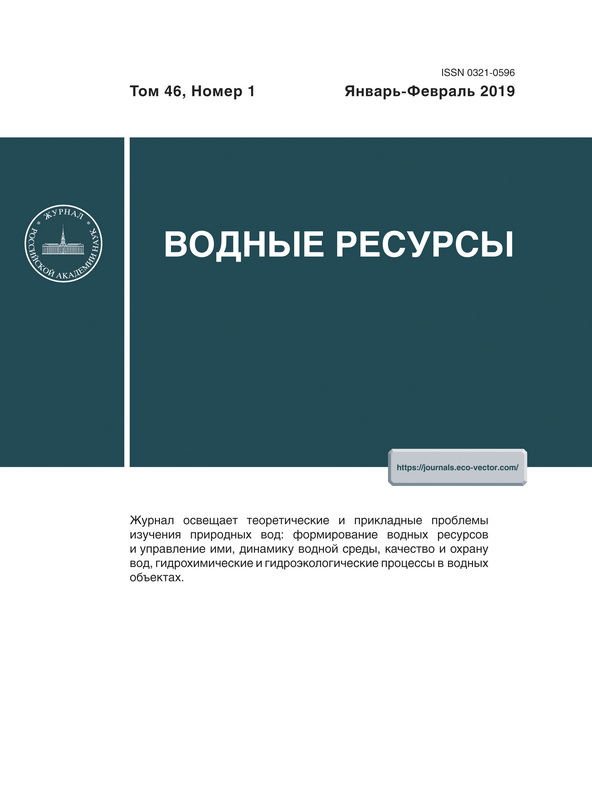A study of long-term changes in Black Sea ecosystems based on data assimilation of remote measurements in a numerical model
- Authors: Dorofeev V.L.1, Sukhikh L.I.1
-
Affiliations:
- Marine Hydrophysical Institute, Russian Academy of Sciences
- Issue: Vol 46, No 1 (2019)
- Pages: 58-69
- Section: Гидрохимия, гидробиология, экологические аспекты
- URL: https://journals.eco-vector.com/0321-0596/article/view/11373
- DOI: https://doi.org/10.31857/S0321-059646158-69
- ID: 11373
Cite item
Abstract
Herein, we present a simulation of the dynamics of Black Sea ecosystems using a three-dimensional interdisciplinary model that assimilates satellite color scanner measurements. Calculations were performed for the fifteen years from 1998 and a set of 3-d biogeochemical fields of the Black Sea were generated on a regular grid with a discreteness time of 1 day. Analyses of core biogeochemical parameters of the marine ecosystem were then performed. The qualities of received fields were evaluated using comparisons with existing data from in situ measurements.
Keywords
Full Text
About the authors
V. L. Dorofeev
Marine Hydrophysical Institute, Russian Academy of Sciences
Author for correspondence.
Email: l.sukhikh@gmail.com
Russian Federation, 2A, Kapitanskaya street, Sevastopol, 299011
L. I. Sukhikh
Marine Hydrophysical Institute, Russian Academy of Sciences
Email: l.sukhikh@gmail.com
Russian Federation, 2A, Kapitanskaya street, Sevastopol, 299011
References
- Демышев С.Г., Коротаев Г.К. Числененая энерго-сбалансированная модель бароклинных течений океана с неровным дном на сетке С // Численные модели и результаты калибровочных расчетов течений в Атлантическом океане. М.: ИВМ РАН, 1992. С.163–231.
- Дорофеев В.Л. Моделирование декадной изменчивости экосистемы Черного моря // Морской гидрофизический журнал. 2009. № 6. С. 71–81.
- Дорофеев В.Л., Коротаев Г.К. Валидация результатов моделирования циркуляции Черного моря на основе данных всплывающих буев // Экологическая безопасность прибрежной и шельфовой зон и комплексное использование ресурсов шельфа. Севастополь: ЭКОСИ-Гидрофизика, 2004. Вып. 11. С. 63–74.
- Дорофеев В.Л., Коротаев Г.К., Суетин В.С., Сухих Л.И. Ассимиляция спутниковых изображений цвета моря в междисциплинарной модели экосистемы Черного моря // Экологическая безопасность прибрежной и шельфовой зон и комплексное использование ресурсов шельфа. Севастополь: ЭКОСИ-Гидрофизика, 2008. Вып. 16. С. 323–332.
- Дорофеев В.Л., Коротаев Г.К., Сухих Л.И. Исследование долговременной изменчивости полей Черного моря с использованием междисциплинарной физико-биогеохимической модели // Изв. РАН. Физика атмосферы и океана. 2013. Т. 49. № 6. С. 1–11.
- Дорофеев В.Л., Сухих Л.И. Изучение долговременной изменчивости динамики Черного моря на основе ассимиляции дистанционных измерений в модели циркуляции // Известия РАН. Физика атмосферы и океана. 2017. Т. 53. № 2. С. 254–264.
- Cуслин В.В., Чурилова Т.Я., Джулай А. и др. Региональный алгоритм восстановления концентрации хлорофилла-а и коэффициента поглощения света неживым органическим веществом на длине волны 490 нм в Черном море для спектральных каналов цветовых сканеров MODIS и MERIS // Экологическая безопасность прибрежной и шельфовой зон и комплексное использование ресурсов шельфа. Севастополь: ЭКОСИ-Гидрофизика, 2014. Вып. 28. С. 303–319.
- Cуслин В.В., Чурилова Т.Я., Сосик Х.М. Региональный алгоритм расчета концентрации хлорофилла-а в Черном море по спутниковым данным SeaWiFS // Морской экол. журн. 2008. № 2. С. 24–42.
- Daskalov G.M. Long-term changes in fish abundance and environmental indices in the Black Sea // Marine Ecol. Progress Ser. 2003. 255. P. 259–270.
- Greґgoire M., Friedrich J. Nitrogen budget of the north-western Black Sea shelf as inferred from modeling studies and in-situ benthic measurements // Marine Ecol. Progress Ser. 2004. 270. P. 15–39.
- Greґgoire M., Lacroix G. Exchange processes and nitrogen cycling on the shelf and continental slope of the Black Sea basin // Global Biogeochem. Cycles. 2003. 17. P. 4201–4217.
- Greґgoire M., Nezlin N., Kostianoy A., Soetaert K. Modeling the nitrogen cycling and plankton productivity in an enclosed environment (the Black Sea) using a three-dimensional coupled hydrodynamical–ecosystem model // J. Geophys. Res. 2004. V. 109. C05007. doi: 10.1029/2001JC001014.
- Greґgoire M., Raick C., Soetaert K. Numerical modeling of the central Black Sea ecosystem functioning during the eutrophication phase // Progress in Oceanography. 2008. 76. P. 286–333.
- Korotaev G. K., Oguz T., Dorofeyev V.L. et al. Development of Black Sea nowcasting and forecasting system // Ocean Sci. 2011. 7. P. 1–21.
- Lancelot C., Staneva J., Van Eeckhout D. et. al. Modelling the danube-influenced north-western continental shelf of the Black Sea. II: ecosystem response to changes in nutrient delivery by danube river after its damming in 1972 // Estuarine, Coastal and Shelf Sci. 2002. 54. P. 473–499.
- Oguz T., Ducklow H.W., Malanotte-Rizzoli P. et al. A physical-biochemical model of plankton productivity and nitrogen cycling in the Black Sea // Deep-Sea Res. 1999. Pt 1. V. 46. P. 597–636.
- Oguz T., Ducklow H.W., Malanotte-Rizzoli P. Modeling distinct vertical biochemical structure of the Black Sea: Dynamical coupling of the oxic, suboxic, and anoxic layers // Global Biogeoch. Cycles. 2000. V. 14. № 4. P. 1331–1352.
- Oguz T., Ducklow H.W., Purcell J.E. et al. Modeling the response of top-down control exerted by gelatinous carnivores on the Black Sea pelagic food web // J. Geophys. Res. 2001. V. 106. № C3. P. 4543–4564.
- Oguz T., Gilbert D. Abrupt transitions of the top-down controlled Black Sea pelagic ecosystem during 1960e2000: evidence for regime shifts under strong fishery exploitation and nutrient enrichment modulated by climate-induced variations // Deep-Sea Res. 2007. Pt I. V. 54. P. 220–242.
- Oguz T., Velikova V. Abrupt transition of the northwestern Black Sea shelf ecosystem from a eutrophic to an alternative pristine state // Marine Ecol. Progress Ser. 2010. 405. P. 231–242.
- Zaitsev Y.P., Mamaev V. Marine Biological Diversity in the Black Sea: A Study of Change and Decline // GEF Black Sea Environmental Programme. N. Y.: United Nations Publ., 1997. 208 p.
Supplementary files





















